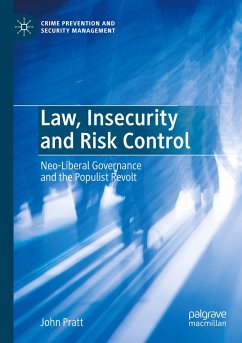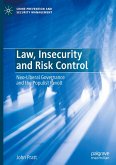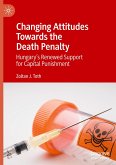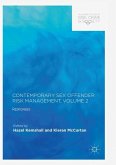This book examines our contemporary preoccupation with risk and how criminal law and punishment have been transformed as a result of these anxieties. It adopts an historical approach to examine the development of risk control measures used across the US, UK, New Zealand, Australia and Canada - particularly since the 1980's - with the rise of the "security sanction". It also takes a criminological and sociological approach to analysing shifts in criminal law and punishment and its implications for contemporary society and criminal justice systems.
Law, Insecurity and Risk Control analyses the range and scope of the 'security sanction' and its immobilizing measures, ranging from control over minor incivilities to the most serious crimes. Despite these innovations, though, it argues that our anxieties about risk have become so extensive that the "security sanction" is no longer sufficient to provide social stability and cohesion. As a consequence, people have been attracted to the 'magic' of populism in a revolt against mainstream politics and organisations of government, as with the EU referendum in the UK and the US presidential election of Donald Trump in 2016. While there have been political manoeuvrings to rein back risk and place new controls on it, these have only brought further disillusionment, insecurity and anxiety. This book argues that the "security sanction" is likely to become more deeply embedded in the criminal justice systems of these societies, as new risks to both the well-being of individuals and the nation state are identified.
Law, Insecurity and Risk Control analyses the range and scope of the 'security sanction' and its immobilizing measures, ranging from control over minor incivilities to the most serious crimes. Despite these innovations, though, it argues that our anxieties about risk have become so extensive that the "security sanction" is no longer sufficient to provide social stability and cohesion. As a consequence, people have been attracted to the 'magic' of populism in a revolt against mainstream politics and organisations of government, as with the EU referendum in the UK and the US presidential election of Donald Trump in 2016. While there have been political manoeuvrings to rein back risk and place new controls on it, these have only brought further disillusionment, insecurity and anxiety. This book argues that the "security sanction" is likely to become more deeply embedded in the criminal justice systems of these societies, as new risks to both the well-being of individuals and the nation state are identified.
"It is beautifully and devastatingly written. It combines heart-stirring prose with astutely observed empirical examples. I have long followed Pratt's research and writing, and this book, in my opinion, is simply his finest." (Jo Phoenix, The British Journal of Criminology, August 18, 2021)
"Law, Insecurity and Risk Control makes a major contribution to our understanding of the recent history and current landscape of criminal justice across the Anglo common law world. ... It is full of rich nuggets of empirical material drawn from across the Anglo world ... that he relies on to both develop and illustrate the analysis. In addition, it is a compelling read." (Russell Hogg, International Journal for Crime,Justice and Social Democracy, Vol. 10 (2), 2021)
"Law, Insecurity and Risk Control makes a major contribution to our understanding of the recent history and current landscape of criminal justice across the Anglo common law world. ... It is full of rich nuggets of empirical material drawn from across the Anglo world ... that he relies on to both develop and illustrate the analysis. In addition, it is a compelling read." (Russell Hogg, International Journal for Crime,Justice and Social Democracy, Vol. 10 (2), 2021)








